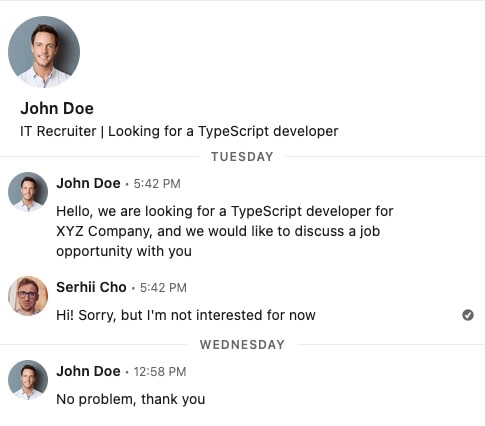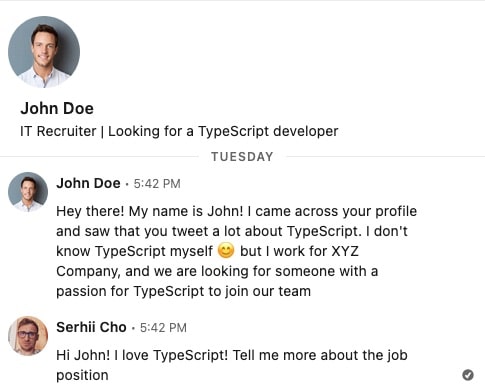Introduction
Recruiting has been one of the most challenging tasks for companies. With the increasing demand for qualified candidates in various industries, recruiters are constantly looking for new and better ways to find talented individuals.
As a programmer, I've had my fair share of interactions with recruiters. Unfortunately, most of these interactions have been ineffective for both of us. But why? There are several reasons for that, this is what I want to discuss in this article.
I would like to draw an image of what it's like from a candidate's perspective to get a message from a recruiter and how recruiters can improve their recruitment strategies to find the right candidates for their organization. Whether you are a recruiter or a jobseeker, you'll find this article useful in understanding the challenges of recruitment from both perspectives.
Before starting to work on this article, I did research on recruitment to get some insights into the recruitment process to get a more profound understanding of the challenges that recruiters face.
Tip. If you are a web developer and looking for a way to earn some money, take a look at my article on "10 Ways to make money in Web development". It provides some valuable tips that could be beneficial.
Disclaimer
Before we begin with the main content, I would like to make one thing clear: not all recruiters and candidates are the same. This is what you should understand by default, but it's worth mentioning again because some people are still going to take things personally.
I'm not a recruitment expert, but as a programmer who has been on the receiving end of different recruitment strategies, I believe that my insight can be valuable to recruiters looking for specialists like myself.
Quality over Quantity
As a candidate, the most common issue I've experienced is that recruiters often seem to prioritize quantity over quality when it comes to finding candidates. This can be frustrating for the candidate because they feel like they're just another name on a long list of potential hires.
It's like they share some universal template for reaching out to candidates without taking into consideration the candidate's unique skills, experience, and interests. Of course, I'm talking about the majority of recruiters, not all of them.
It's also worth mentioning that we are talking about searching for specialists, not entry-level positions. Because the recruitment process for specialists requires a more in-depth understanding of the required skills and experience. Entry-level candidates are typically searched based on potential and enthusiasm, rather than specific skills.
Some LinkedIn messages I've received from recruiters have been clearly copy-pasted and not tailored to my specific profile or skills. This shows a lack of attention to details and makes me feel like they are not taking the time to understand what I can offer.
How do you personalize messages so that don't feel like a generic mass email? Well, this is the job of a recruiter to figure out, but here are a few suggestions from my perspective that could help to make your offers more effective and personalized. One of these suggestions is tailoring messages to the candidate's skills.
Tailor messages to the candidate's skills
This is the most obvious way to make a message more personal. Every specialist has a unique set of skills, qualities, experiences, and interests. A recruiter should take the time to read through a candidate's profile and tailor their message based on what they find.
They should highlight how the candidate's skills and experience make them a great fit for the job opportunity. Take a look at one of the common message templates:
Hi, Serhii! We are currently building the XYZ platform with Go. We are looking for an experienced Golang developer to join our team. Is that something that interests you?
Let me know and we can discuss this further.
![Femaile recruiter is smiling in the costume]()
Jane Doe, Recruiter
The recruiter should mention specific projects or skills the candidate has that make them a good fit for the role. Here is the same message tailored to be more personal:
Hi, Serhii! I was looking through your portfolio and I see that you've worked with Golang on a project that focuses on WEB API, similar to what we are currently working on. This caught our attention as a company, and we would love to learn more about you. Are you interested in talking more about this opportunity? Thanks
![Femaile recruiter is smiling in the costume]()
Jane Doe, Recruiter
This message is much more personalized and shows that the recruiter took the time to look at my profile and understand my experience. I don't get a feeling that you are reading a ChatGPT-generated message that was sent to hundreds of other candidates.
Another strategy to consider is being transparent about the salary.
Be transparent about the salary
Another way to make your messages more effective is to be transparent about potential salary. And I don't mean to write the exact salary in the initial message, but rather to mention the salary range early in the conversation when the candidate is showing interest in the position.
This will save both the recruiter and the candidate a lot of time if salary expectations don't match. Because occasionally the salary expectations can be a deal-breaker for candidates, it's better to address this issue early on.
I don't want to go through the whole process of applying for a job and going through the interview only to find out that the salary is lower than I was making on freelance projects. Knowing the expected salary range from the beginning helps me to evaluate whether it's worth investing time in the process or not. Here is a short example of the message:
Hi again, thank you for showing interest. Here is more information about the position, that is important to mention before moving forward:
- 💶 Your potential salary: $3000 - $3500 monthly;
- 📆 Working days: Mon, Tue, Wed, Thu, Fri;
- 🕣 Working hours: 9:00 am - 4:00 pm (7 hours);
- 👨🏻💻 Remote or on-site: remote, with occasional on-site meetings;
- 🏢 Our company: XYZ Technologies, a startup that specializes in developing mobile apps for healthcare clients.
If you have an issue with any of these details, please let me know, so we can discuss further and see how we can further align on these points. If you would like to know more about us, our team and the project we're working on, I'd be happy to discuss further.
![Femaile recruiter is smiling in the costume]()
Jane Doe, Recruiter
You see how this message is structured with the bullet list, making it easy to digest and understand the most important information. Such a simple format, but it just makes me want to move forward with the process and explore the opportunity further.
With this information, I can decide if it's worth my time to continue with the recruitment process or not.
Maintain a Friendly and Approachable Tone
When recruiters reach out to potential candidates, it's critical to remember that we're talking to human beings, not robots. Recruiters should approach candidates in a friendly and approachable tone, making them feel comfortable throughout the entire process.
Consider this short conversation:

Is it the same message you receive from different recruiters? It doesn't look like the John Doe put much thought into it. Let's see for an alternative:

In this example, the recruiter started by introducing himself, acknowledging that he saw a tweet that caught his attention and wanted to let the candidate know about an open position. It seems like a recruiter put more effort into building a personal connection, rather than just sending a generic message.
Emphasize the company's unique value
High-demand specialists are typically in a position to choose among several opportunities. Articulate the unique aspects of your company, such as its culture, mission, career progression, and any perks or benefits that set your company apart from competitors.
Why would the candidate pick your company over another? What sets your company apart? By emphasizing the company's unique value, recruiters can make candidates feel like they're not just another number in the recruitment process. Let's see a part of the email I got the other day which I really liked. I've changed the message a bit to protect the recruiter's and the company's identity:
🔥 Elite EdTechSoft is an exciting, high-growth educational company revolutionizing the hardware and software that advance collaborative learning. The company develops its own educational software, digital platforms, curriculum, and teaching materials to provide the best user experience.
📚 The goal is to democratize education in the same way that the Khan Academy did with online learning platforms in the early 2000s.
![Femaile recruiter is smiling in the costume]()
Jane Doe, Recruiter
I found it to be a compelling introduction to the company's mission, and it emphasized their unique value in the industry. Unfortunately, they were looking for a Senior Full-Stack (Go+React) developer, and I don't consider myself a Senior with Golang since I don't have that much experience with it. If it was (Laravel+Vue), however, I would have definitely considered applying because of their innovative approach and how they are trying to revolutionize education.
Improving Template Messages
For template messages, I've decided to make a separate section, as it something I see pretty often. What do I mean by template messages? Template messages refer to pre-written messages that recruiters use and send out in bulk to potential candidates.
While these messages can save recruiters time, they typically appear impersonal and spammy. Many people just mark these messages as spam and delete them right away. To make template messages more effective, recruiters can personalize them by adding a sentence or two that is specific to each candidate.
I think it should start with a personalized greeting and mention something specific about the candidate's experience or background. For example:
Hi Alex 👋, I came across your profile on LinkedIn and you caught my attention with your 10 years of experience in software development. You probably receive plenty of offers from different companies around the world 🌍, but I cannot help but reach out to you regarding a position we have open at our company.
We are looking for someone with your skills and knowledge. Our group is searching for individuals who can become a part of our team and create a noteworthy influence on the project. You worked a lot with Java and Kotlin, which is precisely what we need for this position.
![Femaile recruiter is smiling in the costume]()
Jane Doe, Recruiter
You can now copy-and-paste the information about your company and open position, but don't forget to end with a call-to-action that encourages the candidate to respond and continue the conversation. Like:
If this sounds like an opportunity you would be interested in exploring, please let me know, and we can discuss further details about the position.
![Femaile recruiter is smiling in the costume]()
Jane Doe, Recruiter
To understand why we don't like template messages, we can put ourselves in the candidate's shoes. Imagine receiving dozens of messages from recruiters every day, all saying the same thing and sounding generic. It doesn't make the candidate feel special or valued.
Furthermore, it shows a lack of effort on the recruiter's part to truly understand what the candidate is looking for and how their skill set aligns with the company's needs. By personalizing template messages, recruiters can differentiate themselves from the crowd and make a positive impression on potential candidates.
Let's be honest, specialists with many experience in the field are in high demand, and they are already taken by other companies or work on themselves. Therefore, recruiters need to go the extra mile when it comes to attracting top talent. Whether you agree with what I say or not, I'm sure we can all benefit from making our recruitment messages more personal and engaging for candidates.
The Value of Personalized Recruitment
I've never worked as a recruiter myself and I don't know how hard it is to find the right candidates for a job, but I imagine it must be challenging. There is no doubt that finding the perfect match between a company and a candidate is a complex process that requires time, effort, and careful consideration.
However, this is the price you pay for finding the best fit and ensuring a successful hire. Personalization is key, and recruiters who take the time to tailor their messages to each candidate will likely see better results. Of course, it doesn't matter how personalized your message is if the candidate is not seeking employment or is not a good fit for the position.
That's why it's important to study the candidate first and make sure that the message is directed at someone who has the skills and experience needed for the job, as well as a genuine interest in working with the company.
Conclusion
Recruiting talented individuals is not an easy task, but it can be made easier by taking a personalized approach. By tailoring messages to each candidate and demonstrating a genuine interest in their skills and experience, recruiters can differentiate themselves from the crowd and make a positive impression on potential candidates.
While it may take more time and effort to personalize recruitment strategies, the benefits of finding the right match between company and candidate are well worth it in the end. Taking the personalized approach shows that the company cares about its candidates and values their skills, which in turn can lead to stronger engagement from employees.
Any thoughts and ideas you might have about personalized recruitment strategies? Leave a comment down below in the comment section, as it is important to share experiences and learn from each other in this constantly evolving field. I will reply as soon as I will be able.
Keywords: recruiter, doe, hire, hr, candidate, salary

